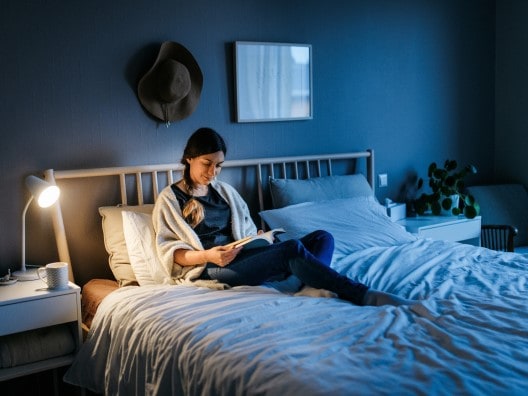9 Tips for Better Sleep Hygiene
Posted on August 17, 2023 By Alison P
It's never a good feeling to spend the wee hours of the morning lying awake in bed because you just can't get to sleep, or to spend your entire day in a fog because you were tossing and turning all night. A common culprit to these kinds of problems is poor sleep hygiene, meaning that your environment and behaviors are not as conducive to a good night's sleep as they could be. If you're looking for tips on how to sleep better, here are nine ways to take better care of yourself and get the rest that you need and deserve!
Decaffeinate
Coffee and tea connoisseurs may not want to hear it, but sometimes the truth hurts: Consuming caffeine too late in the day can catch up with you at bedtime and make it more difficult to fall sleep. While different people metabolize caffeine differently, and your mileage may vary depending on your tolerance levels, it's generally good practice to halt all caffeine intake around eight hours before you plan on going to bed. If you absolutely must have that after-dinner cup, go with a decaffeinated option like decaf coffee or chamomile tea.
Exercise More
Another daytime investment that you can make toward a more restful nighttime is taking the time to exercise. According to Johns Hopkins Medicine, moderate aerobic exercise during the day generally increases the amount of deep, slow-wave sleep that happens at night. Beyond making you physically tired, regular exercise is great for stabilizing your mood and making it easier for you to transition into a relaxed state at bedtime. Of course the health benefits of exercise go way beyond better sleep, so make some time to exercise every day: Sign up for a fitness class, or visit that gym you've been meaning to join. If you're looking for a more flexible fitness option, adding a pedometer app to your phone or wearing a fitness tracker makes it easy to keep track of your daily steps and hit your activity goals.
Avoid Heavy Eating Before Bed
We've all been there: It's late in the evening and you suddenly remember there's a pint of your favorite ice cream in the freezer. Indulging may feel great in the moment, but it comes with a price. Eating heavy foods right before bed can result in you taking longer to fall asleep, not to mention the rude awakening of indigestion. If you must indulge, keep your chosen guilty-pleasure food to one spoonful or one bite. Not only is it better for your sleeping habits, but delaying the gratification means saving more to enjoy later!

Limit Blue Light at Night
Doomscrolling on your phone before bed isn't just a sensory overload in terms of too much news - the light from your phone itself can make it more difficult for your brain to settle down and prepare for sleep. The screens of most electronics like phones, tablets, laptops, and TVs emit blue light, which is the wavelength color most likely to send signals to your brain that it's still daytime. Try to put down your phone as bedtime gets closer, or if a hard cutoff feels impossible, check your phone settings for a night mode where it shifts to a warmer-toned backlight.
Stick to a Bedtime Routine
While we're on the subject of bedtime practices, replacing TV or phone time with a wind-down activity that you always associate with bedtime will help your mind get into a restful state. Of course everyone has the nightly ritual of changing into comfy sleepwear, washing up and brushing their teeth, but making a habit of enjoying a peaceful right-before-bed activity can be a helpful push into dreamland. Reading a book, doing a crossword or sudoku puzzle, or writing in a journal are all simple ways to signal to your brain it's time to switch to sleep mode.
Add White Noise
If you live on a busy street, or you have neighbors who make it no secret that they operate on a different schedule than you, creating some low-volume auditory camouflage may be in order. A white noise machine is a possibility, or if you've got a smart speaker in your bedroom, there's plenty of options for sleep sounds. The simple act of turning on a regular household fan can also do a nice job of creating background noise.
Embrace the Darkness
The sun can wake you up much earlier than you'd planned, and it can be tough to get back to sleep once your room is illuminated with that golden-hour glow. If your budget allows for investing in blackout curtains, they can make a huge difference in quality and quantity of sleep. If you're looking for a simpler and more affordable solution, a comfortable sleep mask can work wonders.
Keep to a Sleep Schedule
Hey, we all enjoy late nights and lazy mornings every once in a while. However, if you're looking to get into better sleep habits, going to bed and waking up at the same times each day is the way to go. Staying consistent in your bedtime and waking-up time keeps your internal clock steady, which leads to an easier time of falling asleep as well as getting up in the morning. Keep in mind that a healthy amount of sleep for an adult is generally between seven and nine hours.

Invest in a New Mattress
What if you've tried all these small changes but they're just not helping? What if the issue is not your sleep habits but your bed itself? The time might be right to find a new mattress that suits your sleeping style as well as your budget. In these modern times, there are all sorts of mattress styles and sizes in any firmness level to suit your personal preferences including coil, hybrid, and memory foam mattresses. If you're ready to set off on a quest to find a new mattress, there's no better time than now to find the perfect match. Good luck, and pleasant dreams!
